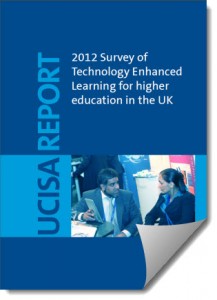2012 Technology Enhanced Learning Survey

Every few years, UCISA (Universities and Colleges Information Systems Association) conducts a survey of the use of Technology Enhanced Learning (TEL) in UK universities and colleges. The report based on this year’s survey has just been published and is available here. Here is a condensed version of the key findings from the executive summary:
Enhancing the quality of learning and teaching is consolidated as are meeting student expectations and improving access to learning for students off campus.
Availability of TEL support staff remains the leading factor in encouraging the development of TEL, followed by central university and school/departmental senior management support, which have overtaken availability and access to tools in the rankings.
Academic staff knowledge has dropped to fifth in the list of barriers influencing TEL development. However, the top two barriers to TEL development remain lack of time and money.
Institutional strategies continue to influence TEL development, with teaching, learning and assessment the leading internal strategy.
The key change since 2010 has been the emergence of corporate strategies, which have overtaken library and learning resources as the second most commonly cited internal strategy influencing TEL.
Dedicated e-learning strategies are on the decline.
Blackboard Learn is still the most common VLE, but Moodle has increased as an enterprise solution and remains the most used VLE when departmental implementations are included. Adoption of other VLEs is negligible.
Plagiarism detection, e-submission, and e-assessment tools remain the most common centrally supported software in use across the sector. E-portfolio, wiki and blog tools are also well established but support for podcasting tools has declined since the 2010 Survey. Social networking, blog and document sharing tools are the most common non-centrally supported tools in use across Pre- and Post-92 institutions.
The proportion of web supplemented modules has steadily decreased with web dependent modules increasing. This suggests that progress has been made in embedding TEL as a key element of course delivery. However, fully online courses have decreased.
Evaluation of the impact of TEL tools and systems on the student learning experience is well established with over half of the institutions responding to the Survey having conducted studies, but evaluation of pedagogy is less common (except in Scotland!)
There has progress towards the optimisation of services for mobile devices.
Mobile technologies have moved to the top of the list of the items making the most demand on TEL support teams. E-assessment and lecture capture remain in the list of top five demands.